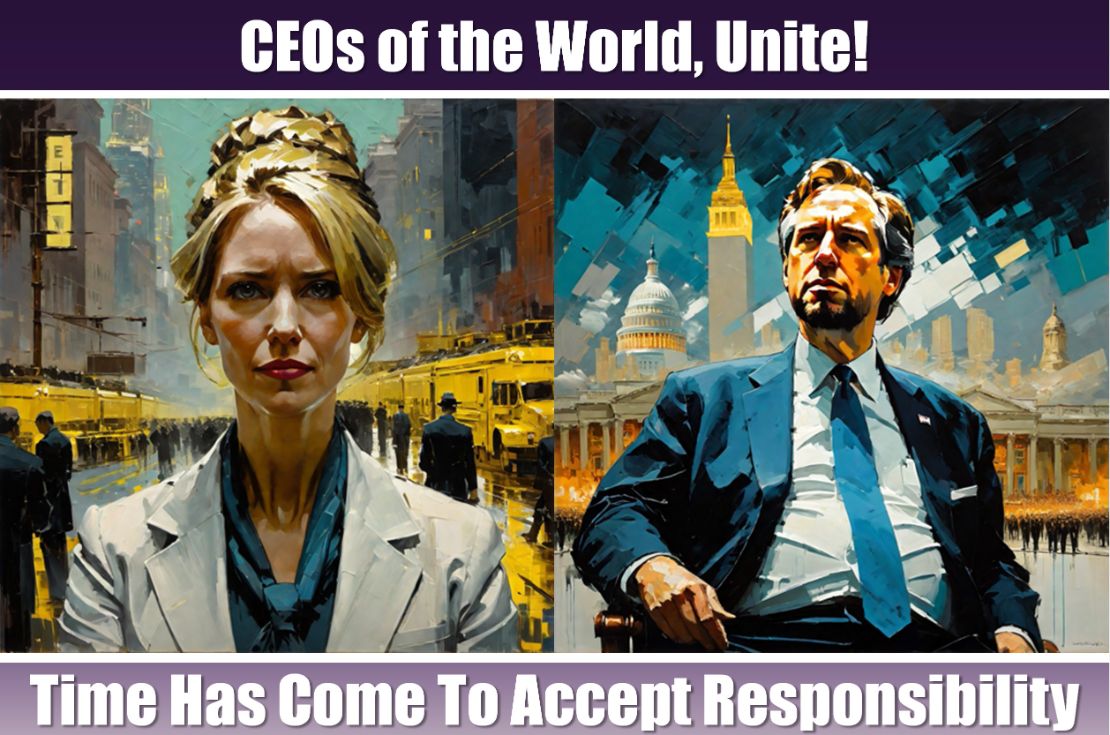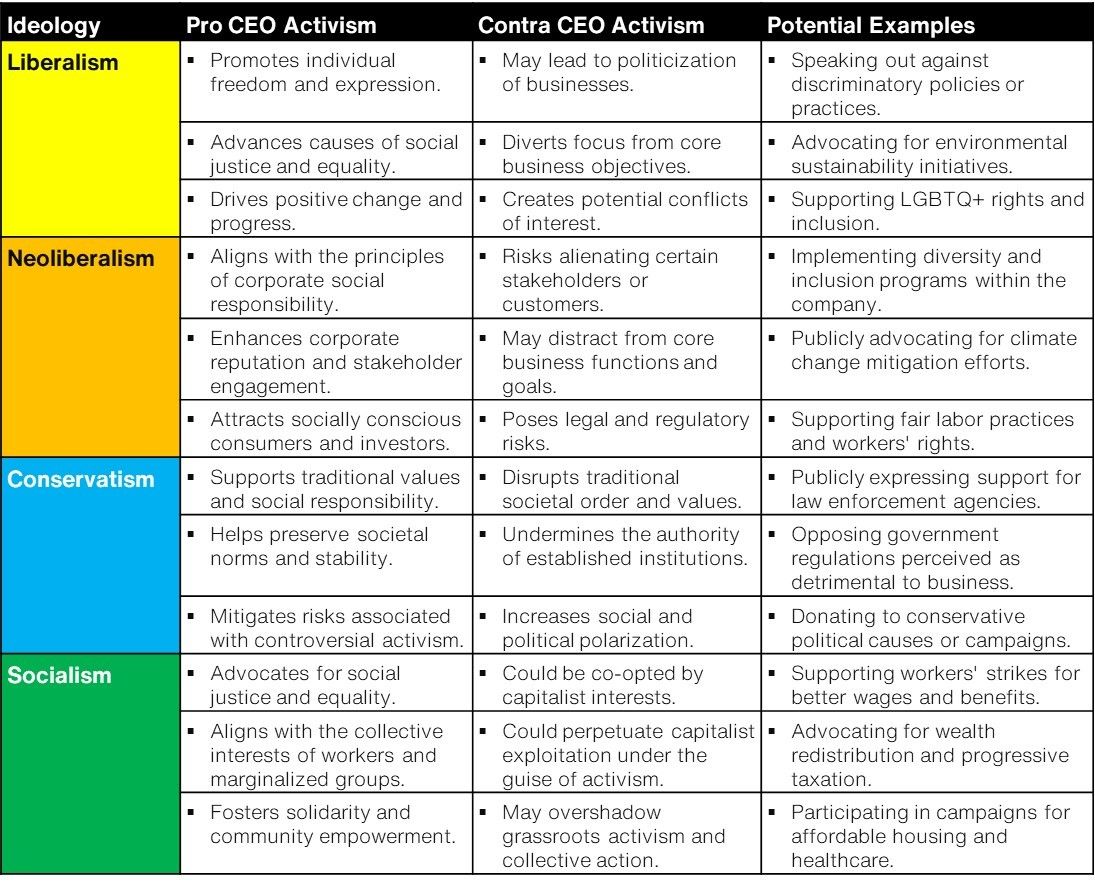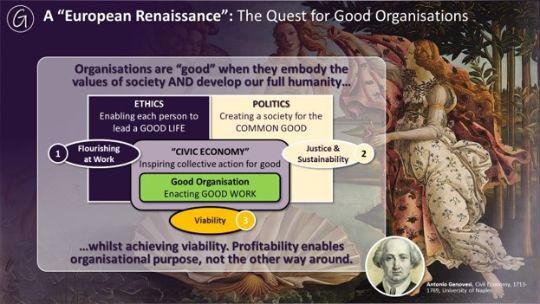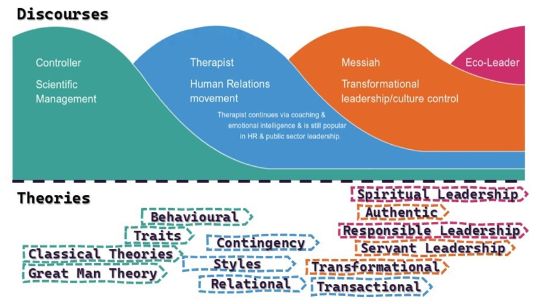
In today's interconnected global world, the role of corporate leaders extends far beyond the traditional confines of the boardroom. As stewards of immense economic power and influence, CEOs are increasingly called upon to address pressing social, environmental, and economic challenges.

In today's interconnected global world, the role of corporate leaders extends far beyond the traditional confines of the boardroom. As stewards of immense economic power and influence, CEOs are increasingly called upon to address pressing social, environmental, and economic challenges.
Corporate political responsibility (CPR) encompasses the idea that corporations have a duty to engage in political processes and advocate for societal interests beyond their immediate business concerns. Proponents argue that CEOs have a unique platform and responsibility to drive positive change on critical issues such as climate change, social inequality, and human rights. Through initiatives like sustainability commitments, advocacy for policy reform, and community development projects, CEOs can leverage their influence to advance the common good. Martin Scholz recently argued that businesses should learn from human rights activism.
However, critics like Martin Reeves or Joe Zammit-Lucia raise valid concerns about the potential risks and limitations of CEO activism. Some argue that CEOs may overstep their bounds by engaging in political matters beyond their expertise, risking alienation of stakeholders and diversion of focus from core business objectives. Moreover, the politicization of corporations could lead to perceptions of bias or conflicts of interest, undermining trust and credibility.
In response to these challenges, I am suggesting a revised focus on what I will call corporate political economic responsibility (CPER). CPER emphasizes the economic dimensions of societal challenges, recognizing that sustainable solutions must be value-driven but also recognise businesses interests to be viable in the long term. Rather than advocating for broad political agendas, CEOs should prioritize initiatives that directly relate to the political economy and contribute to the common good and societal prosperity, such as investment in education and workforce development, support for small and medium enterprises, and promotion of inclusive economic growth.
CPER thus goes beyond industry self-regulation (ISR), which typically involves businesses setting their own standards and guidelines for their industry without significant involvement from external stakeholders. While ISR may address specific industry-related issues, CPER takes a more comprehensive approach by addressing broader societal challenges and promoting systemic change through collective action and collaboration across sectors. Drawing from theories such as communitarianism and civic republicanism, CEO activism is justified by the belief that businesses have a responsibility to contribute to the common good and address societal issues beyond their immediate profit motives.
Unpacking The Ideologies Behind CEO Activism
Naturally, many of the arguments for and against CEO activism stem from underlying political ideologies, emphasizing the need to carefully legitimise any advocacy for greater engagement.
In today's interconnected global world, the role of corporate leaders extends far beyond the traditional confines of the boardroom. As stewards of immense economic power and influence, CEOs are increasingly called upon to address pressing social, environmental, and economic challenges.
Corporate political responsibility (CPR) encompasses the idea that corporations have a duty to engage in political processes and advocate for societal interests beyond their immediate business concerns. Proponents argue that CEOs have a unique platform and responsibility to drive positive change on critical issues such as climate change, social inequality, and human rights. Through initiatives like sustainability commitments, advocacy for policy reform, and community development projects, CEOs can leverage their influence to advance the common good. Martin Scholz recently argued that businesses should learn from human rights activism.
However, critics like Martin Reeves or Joe Zammit-Lucia raise valid concerns about the potential risks and limitations of CEO activism. Some argue that CEOs may overstep their bounds by engaging in political matters beyond their expertise, risking alienation of stakeholders and diversion of focus from core business objectives. Moreover, the politicization of corporations could lead to perceptions of bias or conflicts of interest, undermining trust and credibility.
In response to these challenges, I am suggesting a revised focus on what I will call corporate political economic responsibility (CPER). CPER emphasizes the economic dimensions of societal challenges, recognizing that sustainable solutions must be value-driven but also recognise businesses interests to be viable in the long term. Rather than advocating for broad political agendas, CEOs should prioritize initiatives that directly relate to the political economy and contribute to the common good and societal prosperity, such as investment in education and workforce development, support for small and medium enterprises, and promotion of inclusive economic growth.
CPER thus goes beyond industry self-regulation (ISR), which typically involves businesses setting their own standards and guidelines for their industry without significant involvement from external stakeholders. While ISR may address specific industry-related issues, CPER takes a more comprehensive approach by addressing broader societal challenges and promoting systemic change through collective action and collaboration across sectors. Drawing from theories such as communitarianism and civic republicanism, CEO activism is justified by the belief that businesses have a responsibility to contribute to the common good and address societal issues beyond their immediate profit motives.
Unpacking The Ideologies Behind CEO Activism
Naturally, many of the arguments for and against CEO activism stem from underlying political ideologies, emphasizing the need to carefully legitimise any advocacy for greater engagement.

Across different ideological stances, attitudes towards CEO activism vary. Generally, liberalism favours such engagement for its potential to drive positive change, while conservatism tends to be more cautious, seeing it as potentially disruptive to established norms. Socialism may view CEO activism as a means of challenging corporate power, and neoliberalism may only support it if it fully aligns with market or corporate interests. Drawing explicitly from theories such as communitarianism and civic republicanism, I propose that CEO activism is only justified by the belief that businesses have a responsibility to contribute to the common good and civic virtue, addressing societal issues beyond their immediate profit motives.
Examples of CPER initiatives could include:
- Actively engaging with sector organizations and political parties to shape policies that benefit common interests over special interests.
- Fostering workplace democratization and involving various stakeholders like employees, customers, investors, and civil society organizations to facilitate civic discourse.
- Collaborating with local governments and community groups to jointly invest in infrastructure projects, generating employment, improving quality of life, and strengthening social ties in communities where businesses operate
- Establishing responsible sourcing practices within each sector to uphold fair labour standards, environmental sustainability, and ethical conduct throughout the supply chain.
- Partnering with NGOs, global supranational organisations, and governments to advocate for fair trade policies and market access for marginalized groups and countries.
- Investing in research and development endeavours, alongside governmental efforts, to address global challenges like renewable energy and sustainable agriculture.
- Forming public-private partnerships to tackle systemic issues such as income disparity and healthcare accessibility.
- Launching joint skills training and education programs to empower workers for success in the digital era.
Co-developing Good Leadership
Indeed, while some businesses are already involved in such endeavours, the key argument here is that addressing societal challenges necessitates collaboration beyond corporate confines. Good leadership transcends individual skills and corporate cultures. According to the Global Leadership Society, it embodies a systemic process of generative collective learning and action across multiple levels. Businesses must align themselves with broader movements involving various societal actors to drive meaningful transformation rooted in values. Furthermore, this engagement should extend beyond mere lobbying or public relations efforts; it should be deeply ingrained in the organizational character, involving employees at every level. This isn't about philanthropy; it's about recognizing and fulfilling a systemic civic responsibility within an economy intricately intertwined with society.
Certainly, it's essential to consider the competency and character of CEOs even within this more defined scope, but arguably, they should possess the necessary skills and ethical qualities to fulfill their broader societal responsibilities. It's in the crucial interest of society to ensure that those in leadership positions within corporations are well-equipped and morally upright for their roles. If they are not, they should be removed.
In conclusion, I firmly advocate for CEOs to embrace their unique opportunity and responsibility in advancing positive change through corporate political economic responsibility. As joint political actors within the broader economic landscape, they hold a civic duty to champion economic stewardship, social welfare, environmental sustainability, ethical leadership, and public engagement. By prioritizing initiatives that leverage business competencies and resources, CEOs can fulfill their role as responsible corporate citizens while simultaneously generating long-term value for shareholders and society at large.
Across different ideological stances, attitudes towards CEO activism vary. Generally, liberalism favours such engagement for its potential to drive positive change, while conservatism tends to be more cautious, seeing it as potentially disruptive to established norms. Socialism may view CEO activism as a means of challenging corporate power, and neoliberalism may only support it if it fully aligns with market or corporate interests. Drawing explicitly from theories such as communitarianism and civic republicanism, I propose that CEO activism is only justified by the belief that businesses have a responsibility to contribute to the common good and civic virtue, addressing societal issues beyond their immediate profit motives.
Examples of CPER initiatives could include:
- Actively engaging with sector organizations and political parties to shape policies that benefit common interests over special interests.
- Fostering workplace democratization and involving various stakeholders like employees, customers, investors, and civil society organizations to facilitate civic discourse.
- Collaborating with local governments and community groups to jointly invest in infrastructure projects, generating employment, improving quality of life, and strengthening social ties in communities where businesses operate
- Establishing responsible sourcing practices within each sector to uphold fair labour standards, environmental sustainability, and ethical conduct throughout the supply chain.
- Partnering with NGOs, global supranational organisations, and governments to advocate for fair trade policies and market access for marginalized groups and countries.
- Investing in research and development endeavours, alongside governmental efforts, to address global challenges like renewable energy and sustainable agriculture.
- Forming public-private partnerships to tackle systemic issues such as income disparity and healthcare accessibility.
- Launching joint skills training and education programs to empower workers for success in the digital era.
Co-developing Good Leadership
Indeed, while some businesses are already involved in such endeavours, the key argument here is that addressing societal challenges necessitates collaboration beyond corporate confines. Good leadership transcends individual skills and corporate cultures. According to the Global Leadership Society, it embodies a systemic process of generative collective learning and action across multiple levels. Businesses must align themselves with broader movements involving various societal actors to drive meaningful transformation rooted in values. Furthermore, this engagement should extend beyond mere lobbying or public relations efforts; it should be deeply ingrained in the organizational character, involving employees at every level. This isn't about philanthropy; it's about recognizing and fulfilling a systemic civic responsibility within an economy intricately intertwined with society.
Certainly, it's essential to consider the competency and character of CEOs even within this more defined scope, but arguably, they should possess the necessary skills and ethical qualities to fulfill their broader societal responsibilities. It's in the crucial interest of society to ensure that those in leadership positions within corporations are well-equipped and morally upright for their roles. If they are not, they should be removed.
In conclusion, I firmly advocate for CEOs to embrace their unique opportunity and responsibility in advancing positive change through corporate political economic responsibility. As joint political actors within the broader economic landscape, they hold a civic duty to champion economic stewardship, social welfare, environmental sustainability, ethical leadership, and public engagement. By prioritizing initiatives that leverage business competencies and resources, CEOs can fulfill their role as responsible corporate citizens while simultaneously generating long-term value for shareholders and society at large.
Other popular articles in the KnowledgeHub: Business Transformation




 .
.